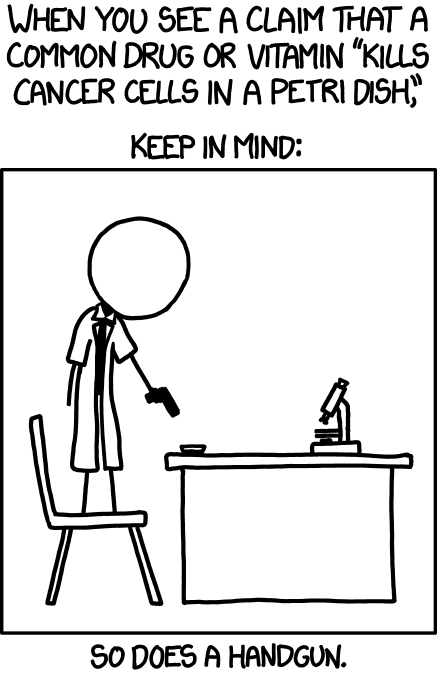In this study, the scientists simulated the process of spaced learning by examining two types of non-brain human cells — one from nerve tissue and one from kidney tissue — in a laboratory setting.
These cells were exposed to varying patterns of chemical signals, akin to the exposure of brain cells to neurotransmitter patterns when we learn new information.
The intriguing part? These non-brain cells also switched on a “memory gene” – the same gene that brain cells activate when they detect information patterns and reorganize their connections to form memories.
in a laboratory setting.

Technically, a handgun also kills cancer in vivo. The problem is the cost to the host body.
Okay but what you’re saying is if I hired a good enough marksman to shoot the cancer out of my body without killing me then that’s a good thing right?
I mean, that’s basically what we do with gamma radiation and chemotherapy, just a little bit more ballistic, right?
Exactly! The only difference is that those use very tiny bullets.
Chemo only applies if it’s doped with a radionuclide, otherwise it’s just regular poison.
Do we need to format our kidneys before becoming a donor now?
Maybe. There are numerous reports of people having changes in personality after organ transplants.
Personality changes following heart transplantation: The role of cellular memory https://pubmed.ncbi.nlm.nih.gov/31739081/
https://www.sciencealert.com/eerie-personality-changes-sometimes-happen-after-organ-transplants
Damn, that’s interesting!
To be fair, I think anyone going through something as traumatic as basically being put into stasis and having their heart cut out and and then having one reattached would change a bit simply because of the process.
I mean, you don’t keep stepping on Lego bricks barefoot after you’ve done so, and we expect people who have had a heart ripped out and then another one reinserted to act the same?..
Many stories like this from fecal exchanges (trans-poo-sions)
Yes, that is also true. Many things make up the mind, and changing a major input, e.g. the microbiota that make a particular mix of short chain fatty acids and other neuro effective compounds, is going to change the cognitive outputs.
Its not the same memory as your brain. your life story is not in your non nerve cells. they have memory the same as yeast has memory but everyone is aware of how we have muscle memory in reptitive tasks.
I think muscle memory is just a phrase, but the training that makes and embed the “muscle memory” is essentially nural
yeah sorry I still feel that is neural just not all the way to the brain. I guess what I was trying to say if the article is not that cells hold your memory but that they hold their type of memories is a similar way.
Not to be a debbie downer here, but it’s important to keep in mind that unless expressly stated otherwise, so-called discoveries that are only published in out-of-the-way (ie. not respected scientific journals) have usually not been peer reviewed or had their results replicated, which is the entire point of the scientific method.
Here’s the paper.
Awesome. Thanks!
Its interestng, but kidney cells are not exposed to patterns of neurotransmiters like nerve cells are. Cells can be reprogramed to be stem cells as well with the right pattern od signals but that does not mean that it really happens in the body.
There are many stories on how the receiver of a transplant has felt themselves being “changed”, sometimes in ways that would remind people of the donor.
MDPI is like the lowest quality slop journal. Like anything gets peer reviewed in that thing.
Its like the blockchain for you body.
I am become nft
Identifier of ownership
“The Body Keeps the Score”
“Muscle memory” is real.
Is there an element of literality to the term “muscle memory”?
Yes, insofar as many reflexive actions, enervation and fiber recruitment thresholds respond to training, such that they “remember“ actions you have performed many times before. There are many clusters of nerves throughout the body called ganglia that are responsible for low-latency control of various functions that would entail too much delay when controlled entirely by the brain.
Generally, the minimum input-process-activation turnaround time of the brain is about 4 hz (240-250 ms) which is too slow for many applications of motor function. But the “co-processing” allowed by the extended nervous system enables the body to, with practice, execute far more rapid and complex action sequences in response to local stimuli. Some actions can be triggered and completed before a signal even makes it to the brain.
Read something like that in an old science fiction novel.
Old man’s brain is placed in a young woman’s body. Her brain was destroyed but most of her memories live on in her body.
Robert Heinlein, I Will Fear No Evil
“Elderly billionaire Johann Sebastian Bach Smith is being kept alive through medical support and decides to have his brain transplanted into a new body. He advertises an offer of a million dollars for the donation of a body from a brain-dead patient. Smith omits to place any restriction on the sex of the donor, so when his beautiful young female secretary, Eunice Branca, is killed, her body is used—without his knowledge and to the distress of some of those around him.”
You can tell it’s a really old book because they talk about $1 million like it’s a lot of money.
I’d read that novel.
Old man hell bent on world domination, but really wants Johnny in math class to ask him to the dance on Friday.
"I Will Fear No Evil, " Robert Heinlein.
One of Iain M. Banks’ Culture novels has an exceptionally old character who is so exceptionally old that he’s had to turn most of his body into memory storage (sounds weird if you think in terms of computers) to keep remembering things. He stores his sexy memories in his balls.
Don’t remember that char, can you refresh my memory (I am fully aware of the irony given the topic under discussion)
He’s in Hydrogen Sonata. The mcguffin guy who everyone is trying to find and talk to because he’s the only person who’s old enough to remember some very important thing about the early days of the Culture.
Reminds me of the guy that got a heart transplant and took up smoking like the original owner of the heart and started dating the original owners ex.
Was that a fictional work or actual patient?
From memory it was an actual patient but I wasn’t easily able to find it from a quick search.
I’ll take your word for it, because nobody ever lied on the interwebs.
[jk, thnaks for the response]
Memory is stored in the balls
Just to recap, sperm, pee, microplastics, and memories are stored in the balls? Am I missing anything? I can’t remember. Maybe my balls are too full of microplastics to recall.
Data.

I keep cement in mine
The Soul is also stored in the balls.
Do you think that’s why we often tell god that we’re cumming?
deleted by creator
😆
And when you fuck someone, you’re giving them your memories.
Still better that “pee is stored in the brain”
Kind of like how there’s taste buds in our lungs.
deleted by creator
And your rectum.
deleted by creator
Yeah last week people on Lemmy were arguing that memory is the simplest thing to exist EVER and that musk’s neuralink meant we had matrix reloaded already at the corner
The hubris never ceases to amaze me
Musk is a snake oil salesman that buys other people’s ideas and pays smart people to make it, then steals all the profits for himself.
Modern day Thomas Edison.
Except he hasn’t electrocuted a live elephant to make a point. Yet.
In related news:
The complications include bloody diarrhea, partial paralysis, and cerebral edema, a condition colloquially known as “brain swelling.”
I was wondering if there is a link between cellular memory and how trauma is encoded into DNA?














